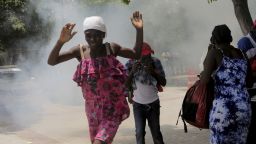Editor’s Note: Catherine Russell is the executive director of UNICEF and principal advocate on Haiti for the Inter-Agency Standing Committee, a collective body of senior humanitarian leaders. The views expressed in this commentary are her own. View more opinion at CNN.
The abduction last week of an American nurse and her child near Haiti’s capital, Port-au-Prince, late last month is yet another tragic sign of intensifying insecurity in the country.
Across Haiti, 2 million people, including 1.6 million children and women, live in areas controlled by armed groups where the perpetration of horrific violence has become a daily reality, according to internal United Nations estimates. Children are killed walking outside or recruited to participate in the fighting, kidnappings for ransom are on the rise and rates of sexual and gender-based violence are surging.

On my most recent visit to Haiti in June, I met another health care worker who had been kidnapped. Thankfully, she was later released. She told me that it was a daily fear for Haitian nurses, as well as teachers and other professionals who, like the American nurse, remain committed to staying and caring for the most vulnerable.
Included among those most vulnerable is the 11-year-old girl I met at Port-au-Prince’s GHESKIO Center, which provides care for survivors of sexual violence. Late last year, she told me, five men from an armed group abducted her while she was walking outside. Three of them took turns raping her. When I met her, she was about eight months pregnant. Several other women at the center spoke of armed men breaking in, raping them — in one case, in front of her children — and then setting their homes on fire.
Violence is not new to Haiti. But after the assassination of President Jovenel Moïse in July 2021, armed groups took over the streets and have been terrorizing communities in several parts of the capital ever since. And with much of Port-au-Prince and nearby areas beset by such brutality, Haiti’s ongoing humanitarian crisis could soon become a catastrophe.
Close to half of the country’s population urgently needs humanitarian assistance, including almost 3 million children, according to on-the-ground information collected by our staff. Nearly 5 million people are experiencing acute food insecurity. And in the last year, we have seen an unprecedented 30% increase in the number of severely malnourished children, which we expect to reach around 115,000 over the course of 2023.
The spike in food insecurity and child malnutrition coincides with an ongoing cholera outbreak in which nearly half of the over 52,000 suspected cases are in children under 14. Severely malnourished children are much more likely to die from cholera without urgent treatment. Yet the national health system does not have the capacity to provide adequate care to vulnerable children and families.
To put the situation in perspective, humanitarian needs in Haiti are greater now than they were in the aftermath of the devastating January 2010 earthquake that left more than 220,000 people dead and over 2 million displaced.
Despite the challenging security threats, our organization remains fully committed to staying and delivering for Haiti’s people. Alongside our partners, we are engaging with community and government leaders to facilitate the safe movement of humanitarian workers and supplies. And we are expanding our response in health, nutrition, child and social protection, education, water, sanitation and hygiene.
But this is not enough to stave off the looming catastrophe. Far more must be done to bring Haiti back from the brink, and we implore governments in the region and beyond to come off the sidelines before it’s too late.
This starts with providing the funds needed to strengthen and sustain the humanitarian response for the next 18 to 24 months. The UN’s $720 million Humanitarian Response Plan for 2023 is barely a quarter funded. We need full funding to get the job done.
But as we tackle the immediate crisis, we must also bear in mind that people need safe and sustainable access to essential services in their communities over the long term. This will only happen if we deepen our engagement with the Haitian government, civil society and community leaders to restore and strengthen the systems that people rely on – such as health care, nutrition services, education, protection, water and sanitation.
For decades, Haiti has seemed to bounce from one crisis to the next — from hurricanes and earthquakes to public health emergencies and political turmoil. We must focus on building the resilience of communities, service delivery systems, and institutions so that they can withstand the range of shocks that Haiti continues to face.
Get Our Free Weekly Newsletter
- Sign up for CNN Opinion’s newsletter
- Join us on Twitter and Facebook
UN Secretary-General António Guterres has urged the UN Security Council to quickly authorize the deployment of a non-UN multinational force to assist the Haitian National Police in quelling the violence — a proposal supported by Haiti’s transitional government.
Based on the desperate situation I saw in Haiti, I strongly agree that the security situation must be urgently addressed. Any force, however, should be accompanied by measures to safeguard humanitarian space and protect people at risk. The UN and the international community should also work with the government to strengthen the justice system so that the perpetrators of the violence, as well as those giving material support to armed groups, are held accountable.
The time for a new approach in Haiti is long overdue. The lives and wellbeing of millions of Haitians are at stake. We must respond not with fatigue or resignation, but with renewed commitment to work alongside them in forging a brighter and more hopeful future.




